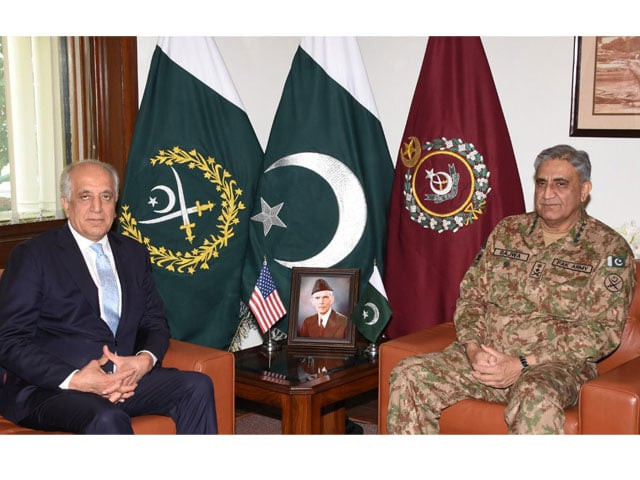Top US negotiation team, army chief discuss Afghan reconciliation process
Ambassador Khalilzad and General Miller meet Gen Qamar in Islamabad

Pakistan’s military leaders reaffirmed their support for US efforts in Afghanistan. PHOTO: ISPR/FILE
Ambassador Khalilzad and Gen Scott Miller, commander of the Resolute Support Mission, held talks with Army Chief General Qamar Javed Bajwa at the General Headquarters to review the latest peace efforts in Afghanistan.
According to a statement of the Inter-Services Public Relations, “Matters of mutual interest, overall regional security situation, including Afghan refugees’ issue/Afghan reconciliation process, were discussed.
“The COAS emphasised that amidst Covid-19 situation, we should not lose track of hard-earned achievements for the Afghan peace process and peace and stability in the region.”
The army chief also updated the visitors on the Pakistan government’s efforts for peace and the prime minister’s call for international community to help alleviate the issues confronting developing world in present circumstances, the ISPR added.
According to statement issued by the US Embassy, Ambassador Khalilzad and Gen Miller in a meeting with General Qamar, discussed the United States’ ongoing efforts for a sustainable peace in Afghanistan.
"Pakistan’s military leaders reaffirmed their support for the US efforts and renewed their commitment to act to advance a political settlement to the conflict," the statement added.
It is believed that the visit was part of efforts to seek Pakistan's help in advancing the intra-Afghan dialogue, which has been delayed because of differences over the issue of prisoner exchange between the Afghan government and the Taliban.
Although, the Afghan government recently freed 300 "low risk" Taliban fighters and insurgents also released 20 Afghan security officials, there is no indication yet if the intra-Afghan dialogue is in sight anytime soon.
The intra-Afghan dialogue was supposed to take place within weeks of the landmark deal signed between the US and the Afghan Taliban on February 29.
However, the process met a roadblock when President Ashraf Ghani refused to abide by the clause in the US-Taliban deal regarding prisoner swap.
What had further compounded the problem was infighting between Ghani and his rival Abdullah Abdullah.
The US tried hard to convince both the leaders to patch up and threatened to review cooperation with Afghanistan.
The threat did work as the Afghan government named a 21-member "inclusive team" for talks with the Taliban.
The key issue regarding the prisoner exchange still persists as the Afghan government is not willing to free 5000 Taliban prisoners, including some high-profile commanders.
The deadlock prompted the Taliban last week to pull out of the negotiations with the Afghan government to finalise modalities for the prisoner swap.
Afghan political chief Mullah Abdul Ghani Baradar recently met Gen Miller in Doha and conveyed concerns regarding the lack of implementation on February 29 deal.
Although, there is no official confirmation, the issue of recent arrest of ISIS-Khorasan chief Aslam Farooqui also came up for discussion between Khalilzad and Gen Qamar.
The Foreign Office last week summoned the Afghan envoy on the issue and conveyed concerns over Farooqui's involvement in anti-Pakistan activities.
Pakistan asked Afghanistan to hand over the Farooqui for further investigation.
Kabul, however, turned down Islamabad's request.
It is believed that Pakistan is persuading Afghanistan through the US to get access to Farooqui, whose group was involved in some of the deadliest attacks in the country.




1724319076-0/Untitled-design-(5)1724319076-0-208x130.webp)














COMMENTS
Comments are moderated and generally will be posted if they are on-topic and not abusive.
For more information, please see our Comments FAQ